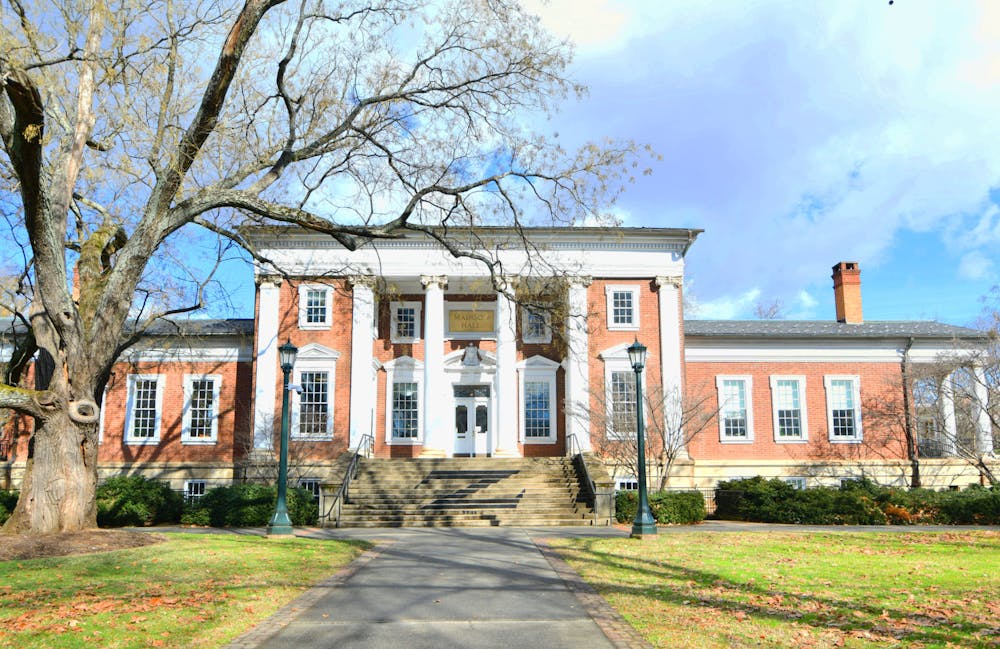The University’s Faculty Senate met Friday to hear speeches from candidates to be the Board of Visitors faculty representative. The Senate also heard remarks from University President Jim Ryan and Provost Ian Baucom, who spoke about contentious issues including free expression and the external review of the Nov. 13, 2022 shooting.
The Faculty Senate is a representative body consisting of elected members from every school, who convene to make decisions regarding academics, including the creation and modification of degree programs. Additionally, the Faculty Senate advises the President on education-related issues. The Faculty Senate elects a Board representative to weigh in on academic issues and represent the broader University faculty. Faculty Senate representatives to the Board serve a one-year term, with elections always taking place online the week after the Board convenes in January.
The candidates for the Board’s faculty representative position are Anthropology Prof. Eve Danziger, Assoc. Prof. Charlotte Hilary Matthews, Kinesiology Prof. Sue Saliba and Michael J. Kennedy, Senate chair and a professor in the School of Education and Human Development.
Each of the candidate’s statements are available on the Senate website. The first to deliver remarks was Danziger, who plans, if selected, to focus on collaboration and compromise towards “incremental improvements rather than pushing forward with radical changes based on [her] individual vision.”
“I'm an anthropologist,” Danziger said, “which means I'm a specialist in trying to understand people whose interests and goals are not my own and even people whose interests and goals initially appear incomprehensible.”
Danziger said she hopes to improve support for staff, because some departments an increasing workload has been placed on tenure-track professors, who are already seeing declining numbers in available positions.
Speaking on his experience in the field of education, Kennedy plans on listening to diverse perspectives, particularly those he does not agree with so as to better understand them. He said he believes strongly in the power of listening, and hopes to build respectful relationships and be clear in his communication.
“We have this representative so that the faculty voice can be advanced,” Kennedy said. “And that's what I hope to do.”
Having received three degrees at the University, Saliba wishes to represent the broader faculty community if selected and believes that diverse perspectives are important in decision making. She believes her connections across several schools would be especially valuable in ensuring she speaks for a large amount of faculty.
Drawing from the hardships endured throughout her career, Matthews plans to build a more “compelling and communal relationship between the Board and Faculty Senate.” She believes her personal experience with involvement in the University and Charlottesville communities while dealing with significant challenges makes her a strong candidate to represent her peers.
“I think I'm very skilled at quietly ironing out the linen tablecloth and saying this is gonna work,” Matthews said. “I'm very good at building bridges.”
Ryan and Baucom also addressed the Senate with updates on progress made towards initiatives important to faculty. Ryan discussed his commitment to safety and provided an update on his Community Safety Working Group, which he put together to reduce gun violence in Charlottesville. The working group has collaborated with the Charlottesville and Albemarle County governments to discuss implementation of certain policies, and they are advocating for a piece of state legislation that would close a loophole that legally allows firearms in University buildings.
Ryan also gave an update on the external review following the Nov. 13 shooting in 2022. Ryan is working to get the review out without interfering with the prosecution.
“It is not a comfortable spot to be in, not releasing this report,” Ryan said. “I would prefer that it already be out. We are trying to do what we can to get it out as quickly as possible.”
In this process, Ryan also mentioned working with the families of the victims and other students present that day in order to resolve legal claims related to the incident.
Additionally, Ryan spoke of second-year housing in the Emmett Ivy corridor and a new center for the arts. According to Ryan, the University continues to work towards all second-years being required to live on Grounds, but that goal remains out of reach as at least 1,800 more beds are needed to accommodate the class size.
After Ryan’s speech, Baucom addressed the Senate to discuss the University’s commitment to create a safe space for academic freedom and free expression, especially regarding the Israel-Palestine conflict. Baucom mentioned the importance of ensuring that students were able to express themselves even in times of disagreement.
“We're working with Student Affairs and many of the teams with the Karsh Institute to think about things we can do to help students kind of get together, speak, to help equip them to think about how you have a conversation about something in which you might have a fundamental disagreement.” Baucom said.
The Faculty Senate will meet again on Feb. 16.







